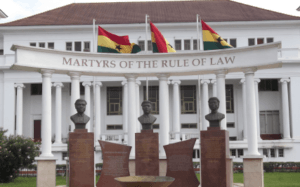EC can’t declare Special Voting results ahead of Election Day
 The Supreme Court has ordered that the Electoral Commission (EC) cannot declare the results of the Special Voting to be cast on December 1, immediately after the polls.
The Supreme Court has ordered that the Electoral Commission (EC) cannot declare the results of the Special Voting to be cast on December 1, immediately after the polls.
“If the results of the Special Voting were declared on December 1, ahead of the general poll on December 7, the sanctity and secrecy surrounding the elections would gravely be prejudiced, and as well prejudice the electoral fairness,” the Supreme Court stated in a ruling in Accra, on Monday.
The Supreme Court, therefore, quashed the writs filed by Dr Kwame Amoako-Tuffuor of the opposition New Patriotic Party (NPP), to compel the EC to declare the results of the Special Voting on the same day such votes are cast.
The Supreme Court said the reliefs sought by the plaintiffs were inconsistent with the 1992 Constitution. “The Court cannot grant reliefs that run contrary to the provisions of the Constitution”.
In the suit, Dr Amoako-Tuffuor and two other plaintiffs, argued that those who would take part in the Special Voting must not be made to wait until the Election Day before the results of the early voting were announced.
However, according to the apex Court, if the results of the Special Voting were declared before the general election on December 7, the results would influence the general poll and “the integrity of the national elections would be compromised”.
The Supreme Court also stated that the plaintiffs had not been able to cite any country, which declared its results of Special Voting on the same day it was cast.
The Court stated that the EC would have to strike a balance between electoral provisions and electoral rights.
The Court also explained that ballot boxes of the special voting were kept at sacred and secured places, and ballot boxes protected with EC and other political parties seal.
The plaintiffs argued that under Section 23 of C.I. 94 – the law that regulates national elections – was at variance with Article 49 of the 1992 Constitution.
Security personnel, electoral officials, journalists, and people who get busy with the elections on Election Day are those who normally take part in the Special Voting.
After the ruling, Dr Amoako-Tuffuor said he respected the decision of the Supreme Court.
On October 27, 2016, Dr Amoako-Tuffuor with Benjamin Arthur and Adreba Abrefa Damoah, filed a suit seeking that those who wanted to take part in the special voting should not be made to wait until the total results on actual polling were declared and that the results should be declared immediately after the polls closed.
They argued that section 23 of C.I. 94; the law which regulated the conduct of the Polls, was inconsistent with Article 49 of the 1992 constitution.
According to them per the C.I. 94, the Returning Officer shall at the end of the special voting: ensure that the ballot boxes used in the special election were kept in safe custody after the poll had closed.
Also, the Officer was to ensure that the ballot boxes were sealed with the seals of the EC and any candidates or party who wished to add their seal.
The EC also arranged for the ballot boxes to be opened at the time of the counting of the votes cast on the polling day and the ballot papers counted in the same manner as those contained in the ballot boxes used on the main polling day.
The plaintiffs were thus seeking a true and proper interpretation of Article 49 of the Constitution of the Republic of Ghana, 1992, as against special voting’ in CI.94.
The plaintiffs were also seeking a true and proper interpretation of Article 49 of the Constitution “and Section 13 of the Representation of the People Law, 1992; PNDCL 284.”
The Plaintiffs said that presidential and parliamentary elections ought to be counted and announced there and then on the date(s) of the special voting by the Presiding Officers and the results at each polling station before communicating same to the Returning Officer.
In addition, they were seeking an order striking down Regulation 23(11) of Public Elections Regulations, 2016; CI.94 as being inconsistent with Article 49(2), (3)(a) and (b) of the Constitution of the Republic of Ghana, 1992 and Section 13 of the Representation of the People Law, 1992; PNDCL 284.
Source: GNA
